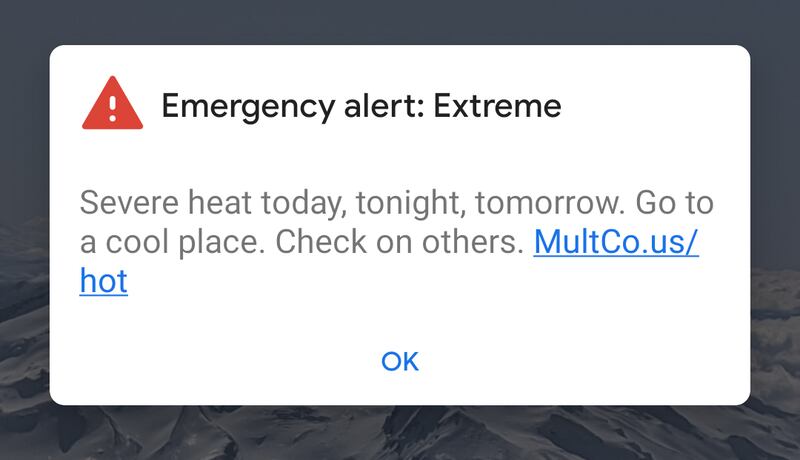For much of Friday, Multnomah County officials were inundated with complaints from people startled and annoyed by a shrieking alarm sounding on their cellphones.
Officials were pleased. They had gotten the public’s attention.
“Emergency alert: Extreme,” read the push notification. “Severe heat today, tonight, tomorrow. Go to a cool place. Check on others.”

The message, accompanied by a shrill noise, arrived on every cellphone in Multnomah County (and some in Clackamas and Washington counties) via a system established by the federal government called Wireless Emergency Alerts. (It linked to a website directing people to cooling centers.)
Local governments can access WEAs for impending nature disasters: flash floods, tsunamis and hurricanes.
Multnomah County Chair Deborah Kafoury decided the 104-degree forecast qualified as such a catastrophe.
County officials said one person died Thursday in Portland from possibly heat-related symptoms, but they have released no details of that fatality. (Update, Aug. 14: The medical examiner now says that death was not related to the heat.) Reuters reports that 800 people have taken shelter at Portland-area cooling centers over the past three days.
County spokesperson Julie Sullivan-Springhetti tells WW that the warm overnight temperatures combined with the strain on hospitals from the Delta surge create an urgent situation. The medical system could not support a repeat of the June heat dome, when emergency rooms were packed with victims of heatstroke and exhaustion.
“The goal was to keep people out of emergency rooms,” Sullivan-Springhetti says. “The hospitals are completely at capacity. COVID has jammed up the hospitals. Last time, we had 150 people in emergency rooms from the heat.”
The alert represents a promise kept by Kafoury: In July, following at least 62 heat-related deaths in the county, she pledged to WW that local officials would send a push notification if they expected dangerous temperatures. “Having an alert system, like an earthquake alert,” she said. “That’s just something that didn’t cross our minds, but I’m darn sure going to do it next time.”
Portland Mayor Ted Wheeler signed off on the plan. (He had previously used WEAs to warn of civil unrest during protests last year.)
In the event, it didn’t get all that hot in Portland on Friday. The temperature at the airport crested at 96 degrees—although the air was choked with wildfire smoke, creating dismal air quality conditions.
Sullivan-Springhetti says the goal was to reach people who could not otherwise be contacted—even if others were startled.
“It was highly irritating, I’m sure, for many people,” she says. “We immediately got [calls from] a lot of angry cat owners.”

